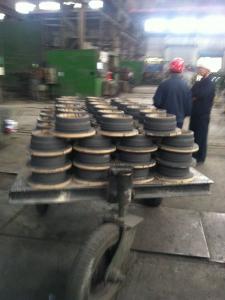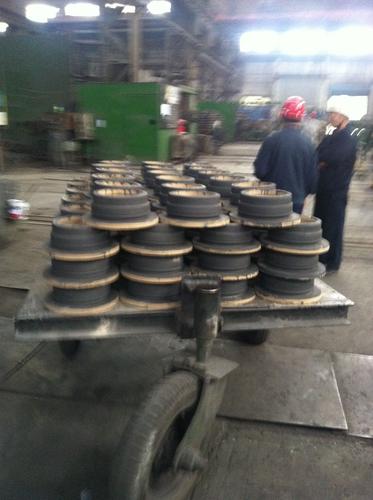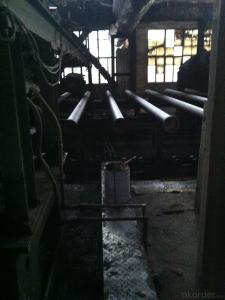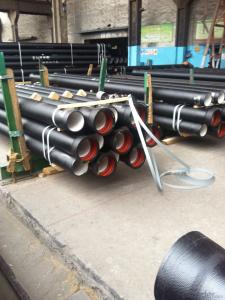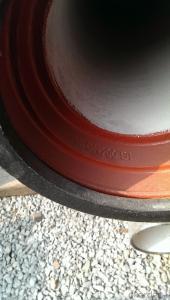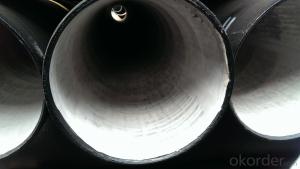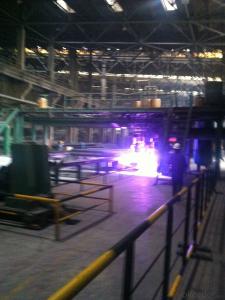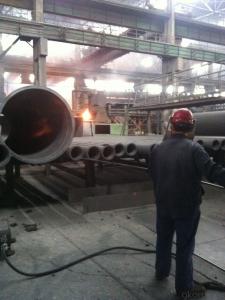DUCTILE IRON PIPES & FITTINGS K7CLASS DN500
- Loading Port:
- Tianjin
- Payment Terms:
- TT OR LC
- Min Order Qty:
- 33 pc
- Supply Capability:
- 3000 pc/month
OKorder Service Pledge
OKorder Financial Service
You Might Also Like
Specifications
· Material : Ductile Cast Iron
· Size Range : DN 80mm to DN 2000mm
· Unit Effective Length : 6m or 5.7m
· Manufacture Standard: ISO 2531:1998/ EN 545:2006/EN 598:2007
· Annual capacity : 200,000 tons
· Coating Exterior: Zinc 130g/m2 according to ISO 8179-1 and bitumen coating 70 microns.
· Cement Interior: Portland Cement/ High Alumina Cement/ Sulphate Resisting Cement Lining according to ISO 4179
· Special requirements on external coating and internal lining can be applied
· We also provide accessories such as SBR/EPDM rubber gaskets, lubricant paste, pipe caps, PE sleeves, etc.
Additional Parts:
Each pipe is strictly inspected according to related standard to ensure permanently high performance.
Easy Installation at site and service free for life
Long Service Lifespan
Quotation will arrive you within 24hours once we get your inquiry.
We guarantee offering you a competitive price.
A copy of original inspection reports of pipes will be offered after shipment.
Photos of loading process will be sent to the customer after shipment effect.
We will follow-up the delivery progress after shipment effect and update to the customer on weekly basis.
- Q: Are ductile iron pipes suitable for bridge crossings or crossings under roadways?
- Yes, ductile iron pipes are suitable for bridge crossings or crossings under roadways. They possess high strength and durability, making them capable of withstanding heavy loads and traffic conditions. Additionally, their flexibility and resistance to external pressures make them an ideal choice for such applications, ensuring long-lasting and reliable performance.
- Q: Can ductile iron pipes be used in areas with high levels of hydrogen sulfide gas?
- Ductile iron pipes can generally be used in areas with high levels of hydrogen sulfide gas, but it is important to consider certain factors before making a decision. Hydrogen sulfide gas is corrosive and can potentially cause damage to metal pipes over time. While ductile iron is known for its durability and corrosion resistance, prolonged exposure to high levels of hydrogen sulfide gas can still lead to corrosion and deterioration. To mitigate the risks associated with hydrogen sulfide gas, it is advisable to assess the specific conditions of the area beforehand. This includes conducting a comprehensive analysis of the hydrogen sulfide gas concentration, pH levels, temperature, and other factors that may influence corrosion. Consulting with experts or engineering professionals who specialize in corrosion control can provide valuable insights and guidance. In some cases, additional measures may be necessary to protect ductile iron pipes. Coating the interior and exterior surfaces of the pipes with protective materials, such as epoxy or polyethylene, can provide an extra layer of defense against corrosion. Alternatively, cathodic protection systems can be employed to protect the pipes by applying a low voltage electrical current that mitigates the corrosion process. Ultimately, the decision to use ductile iron pipes in areas with high levels of hydrogen sulfide gas should be based on a thorough understanding of the specific conditions and implementing appropriate corrosion prevention measures. Regular monitoring and maintenance should also be conducted to ensure the pipes are functioning optimally and to address any potential issues before they escalate.
- Q: How do ductile iron pipes perform in high-altitude areas?
- Ductile iron pipes perform well in high-altitude areas as they are highly resistant to corrosion and can withstand extreme temperature variations. The material's flexibility and strength make it suitable for handling increased pressure caused by altitude changes, ensuring reliable water distribution systems even in mountainous regions.
- Q: Can ductile iron pipe be used for nuclear power plants?
- Yes, ductile iron pipe can be used for certain applications in nuclear power plants. Ductile iron pipe is known for its strength, durability, and corrosion resistance, making it suitable for various industrial and infrastructure projects. However, when it comes to nuclear power plants, specific factors need to be considered. One of the primary concerns in a nuclear power plant is the safety and reliability of the materials used. While ductile iron pipe meets many requirements, it may not be the ideal choice for critical applications such as transporting radioactive fluids or handling high-pressure or high-temperature systems within the plant. These applications often require materials with exceptional resistance to corrosion, stress, and radiation damage. In nuclear power plants, other materials like stainless steel, nickel alloys, or even specialized materials like Inconel are commonly used due to their superior properties. These materials offer better resistance to radiation-induced embrittlement, corrosion, and high-temperature and high-pressure conditions. Therefore, while ductile iron pipe may have its uses in non-critical applications within nuclear power plants, it is important to consult industry experts, engineers, and comply with relevant nuclear safety regulations to determine the most appropriate materials for specific applications within the plant.
- Q: How are ductile iron pipes tested for quality assurance?
- Ductile iron pipes undergo various testing procedures to ensure their quality and meet industry standards. These quality assurance tests are conducted on both raw materials and finished products to ensure the durability, strength, and overall reliability of ductile iron pipes. One of the initial tests is the chemical analysis of the raw materials used in manufacturing the pipes. This analysis ensures that the composition of the iron, carbon, and other elements is within the specified range, as different compositions can affect the pipe's strength and corrosion resistance. Next, mechanical tests are performed to evaluate the strength and ductility of the pipes. Tensile tests are conducted to determine the ultimate tensile strength, yield strength, and elongation properties of the pipe. This helps in assessing the pipe's ability to withstand external pressure or bending forces. Additionally, impact tests are performed to evaluate the pipe's resistance to sudden loading or impact. This test measures the energy absorbed by the pipe when subjected to a high impact force, ensuring that it can withstand potential accidental impacts during installation or operation. Another critical test is the hydrostatic pressure test, which checks the pipes' ability to withstand internal pressure. In this test, the pipes are filled with water and subjected to a specified pressure for a specific duration. This ensures that the pipes can withstand the expected operating pressure without any leakage or failure. Furthermore, dimensional and visual inspections are conducted to ensure that the pipes meet the required specifications. These inspections include checking the pipe's outer diameter, length, wall thickness, and overall appearance for any defects, such as cracks, voids, or irregularities. Lastly, corrosion resistance tests are performed to assess the pipe's ability to resist corrosion when exposed to different environments or fluids. This helps in determining the expected lifespan of the pipes and their suitability for various applications. Overall, these quality assurance tests play a crucial role in ensuring that ductile iron pipes meet the required standards and provide reliable and long-lasting performance in various infrastructure projects.
- Q: What is the cost of ductile iron pipe compared to other pipe materials?
- The cost of ductile iron pipe compared to other pipe materials can vary depending on various factors such as the size, length, and specific requirements of the project. However, generally speaking, ductile iron pipe tends to be more expensive than some of the alternative pipe materials such as PVC or HDPE (high-density polyethylene) pipes. Ductile iron pipe is known for its exceptional strength and durability, making it suitable for a wide range of applications including water distribution, wastewater systems, and industrial piping. Its robustness and longevity contribute to its higher cost compared to other pipe materials. On the other hand, PVC and HDPE pipes are often more affordable options due to their lower production and material costs. Additionally, these materials are lightweight, easy to install, and resistant to corrosion, which can lead to cost savings during installation and maintenance. It is important to note that while ductile iron pipe may have a higher upfront cost, its superior strength and longevity can result in long-term cost savings by minimizing the need for frequent repairs or replacements. The choice of pipe material should be made considering the specific project requirements, budget constraints, and the anticipated lifespan of the infrastructure.
- Q: Why is the cast iron tube lined with cement? Under what circumstances are ductile iron pipes lined with cement, and under what circumstances do not have to be lined with cement?
- The cement lining protects the water quality, reduces the head loss and improves the service life of the spheroidal graphite pipe. As long as the water delivery hose is used, the cement lining must be used. There is no lining cement for conveying air.
- Q: Are ductile iron pipes suitable for horizontal directional drilling?
- Yes, ductile iron pipes are suitable for horizontal directional drilling due to their high strength and flexibility, which allows them to withstand the stress and bending forces during the drilling process.
- Q: Classification of cast iron pipes
- Water cast iron pipe:The use of cast iron cast iron water pipe of No. 18 above by adding nodulizer, after centrifugal ductile cast iron pipe by centrifugal casting machine, the performance of ductile iron pipe with nature, iron and steel, excellent corrosion resistance, good ductility, good sealing effect, simple installation, mainly for municipal, industrial and mining enterprises water, gas, oil etc.. Water supply pipe is the first choice, with high cost performance.
- Q: Can ductile iron pipes be used for wastewater treatment plants?
- Yes, ductile iron pipes can be used for wastewater treatment plants. Ductile iron pipes are known for their strength and durability, making them suitable for handling the harsh and corrosive environment of wastewater treatment plants. These pipes can withstand high pressures and are resistant to corrosion, which is essential in handling wastewater and various chemicals involved in the treatment process. Ductile iron pipes also have the advantage of being easy to install and maintain, with a long service life. Therefore, they are commonly used in wastewater treatment plants for transporting and distributing wastewater throughout the facility.
Send your message to us
DUCTILE IRON PIPES & FITTINGS K7CLASS DN500
- Loading Port:
- Tianjin
- Payment Terms:
- TT OR LC
- Min Order Qty:
- 33 pc
- Supply Capability:
- 3000 pc/month
OKorder Service Pledge
OKorder Financial Service
Similar products
Hot products
Hot Searches
Related keywords
